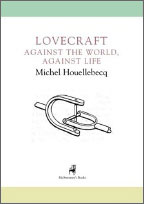 |
 Michel Houellebecq
Michel Houellebecq
H. P. Lovecraft: Against the World, Against Life
Reviewed by: Rick Kleffel © 2005
Translated from the French by Dorna Khazeni
Believer Books / McSweeney's
US Trade Paperback
ISBN [TBD]
Publication Date: 04-01-2005
150 Pages; $18.00
Date Reviewed: 03-14-05
Index:
Non-Fiction
Horror
General Fiction
Fantasy
We've seen discussions of Lovecraft, his work, and his life that are dull, embarrassing, earnest, annoyingly disparaging and erudite. Rarely have we seen such a work that demands to be read aloud. Michel Houellebecq's 'H. P. Lovecraft: Against the World, Against Life' is just such a work. Not only will you want to read it aloud, you'll be allowed to read it aloud. Houellebecq is so outrageously, brashly entertaining that he manages the very difficult feat of making you forget that Stephen King writes the introduction. This is no criticism of King; rather the opposite. King's introduction is letter-perfect and highly entertaining in the way that only King's non-fiction can be. It's funny, intelligent and it prepares the reader for what is to follow.
Almost.
Houellebecq's "first novel" -- as he calls it in his own Preface -- will strike even the non-Lovecraft reader with the same force that Lovecraft's work itself strikes the minds of impressionable teenagers. It just grabs you by the throat, plunges you into a world of unutterable terror and doesn't back down or let go until the very last word. Houellebecq, with the able help of translator Dorna Khazeni has fashioned an exegesis of Lovecraft and his work that is the equal of its subject. Houellebecq is the kind of writer who is so amazingly outrageous that you'll repeatedly ask yourself, "What is wrong with this guy?"
He's French.
And he's right, at least as fast as his thoughts about Lovecraft, life itself and Lovecraft's work go. Or, if you disagree, and plenty of readers will, he is so wrong that he manages to go around the back and come out right. Lovecraft fires up Houellebecq with a passion that generally causes people to picket politicians, scream at talk show hosts, form focus groups and write outstanding criticism. He's shouting mad, and he's got a razor sharp wit with which to dissect Lovecraft's life and work. The remains are there on the pages of the book, as shocking as the visceral fears that Lovecraft himself both felt and fostered.
"Life is painful and disappointing. It is useless, therefore to write new realistic novels. We generally know where we stand in relation to reality and don’t care to know any more."
Thus begins the text itself. It starts white-hot and keeps the same fire going until the final flame-out. Houellebecq apprehends Lovecraft in terms of what he calls Lovecraft's "great texts", that is, the classic stories that caught our interest and corrupted us for life. These "great texts" are not flawed gems. They are not good ideas tainted by bad writing. They are, he suggests, the result of distilled, howling fear and hatred, and they possess power not in spite of those aspects usually perceived as flaws but because of them.
Houellebecq's arguments are passionate, powerful and outrageously entertaining. Where else can you read sentences like these?
"Absolute hatred of the world in general, aggravated by an aversion for the modern world in particular. This summarizes Lovecraft's attitude fairly accurately."
Say what? But wait -- there's more:
"Many authors have dedicated their work to elaborating the reasons for this legitimate aversion. Not Lovecraft. For him, hatred of life precedes all literature. He will remain steadfast in this regard. The rejection of all forms of realism is a preliminary condition for entering his universe."
Houellebecq does a lot more here than rant pithily and entertainingly. He begins with Lovecraft's rejection of life and works his way through Lovecraft's life itself. He focuses on what he calls Lovecraft's "Technical Assault" on literature as we know it and on the universe as we hope never to know it. He examines the roles each of the senses in Lovecraft's work and talks about the conspicuous absence of sex and economics. He's smart, snappy and has an attitude about the size of the sunken city of Rl'yeh. Now matter how much you might think you know about Lovecraft and his work, count on Houellebecq coming at it from a new and radical angle. Moreover, you can be sure he'll make you laugh, scream, or read the book aloud to whoever is in your vicinity. Regardless of the compelling subject, this is great writing by a writer who cares. He succeeds in the all-important task of making the reader care about Lovecraft. You'll be glad that Houellebecq's essay is on the short side, because the second you finish, you'll want to read the two "great texts" that McSweeney's has included in this book -- 'The Whisperer in Darkness' and, of course, 'The Call of Cthulhu'.
This, the second book in the Believer Books imprint from McSweeney's, is a sure-fire contender for Best non-fiction awards from the HWA and the IHG. Moreover, it's both incredibly fun to read and thought provoking. Houellebecq effectively makes the case that Lovecraft is a great writer, a writer better understood for having read Houellebecq's amazingly entertaining work. Readers who have thus far resisted 'The Call of Cthulhu' would be well advised to pick up this book. There's no doubt that it will inspire you to read some great writing, and you'll find it all the more enjoyable for having read Houellebecq's take on that writing. "Attack the Story Like a Radiant Suicide," Houellebecq tells us in a chapter title. Join Michel Houellebecq and 'H. P. Lovecraft: Against the World, Against Life.'
|
 |
